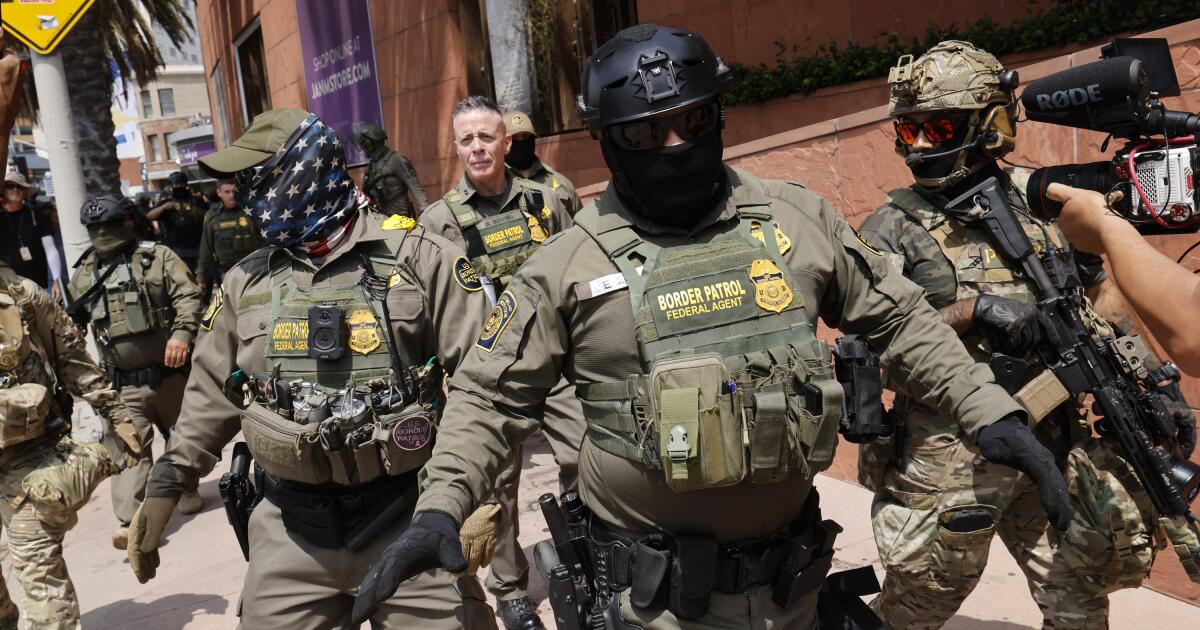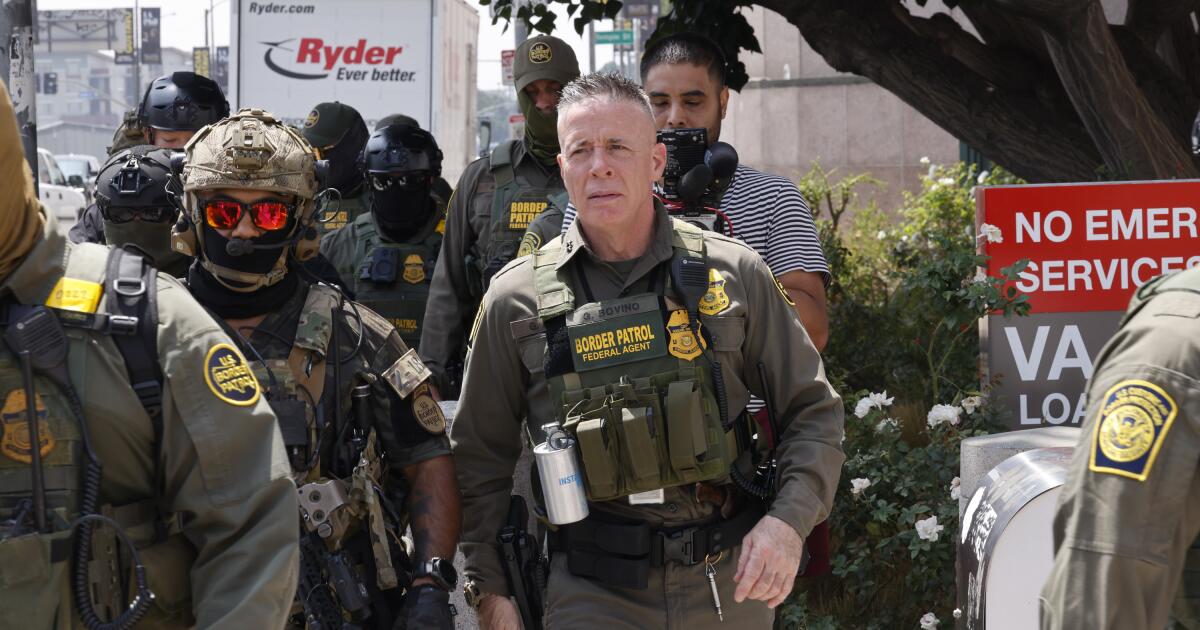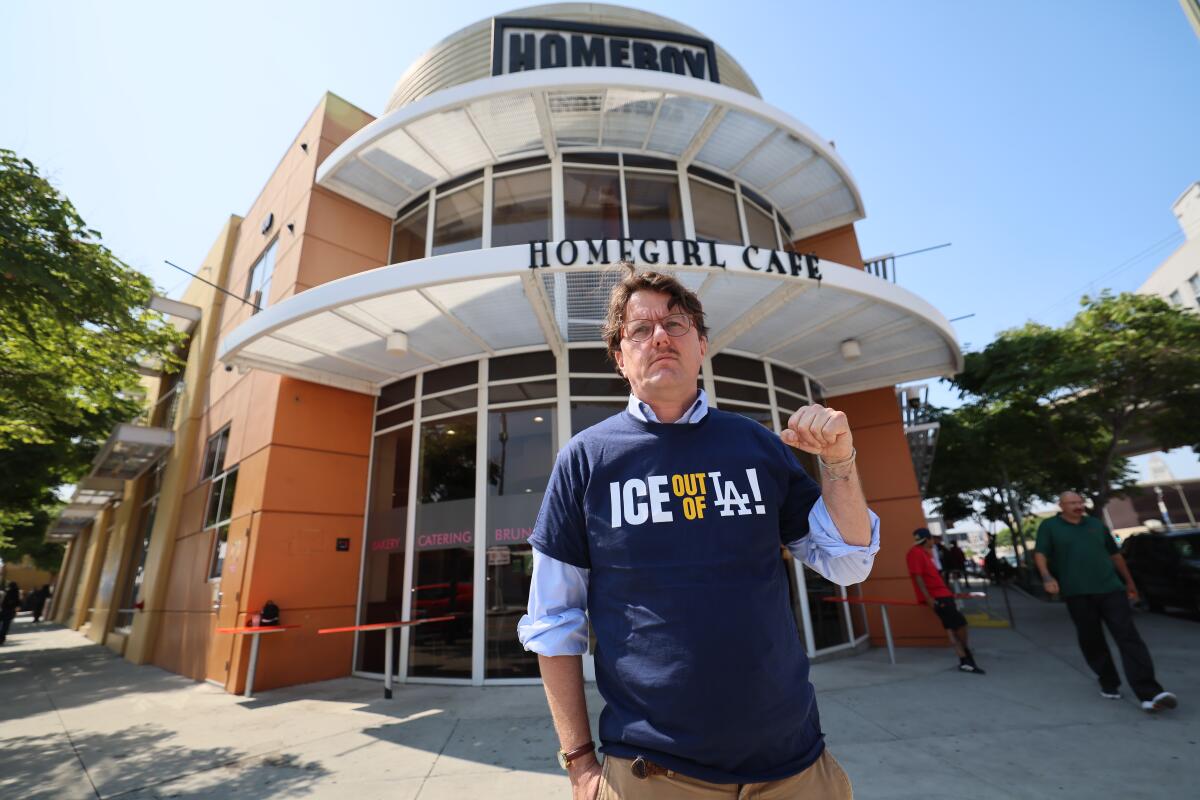ICE officials in major cities replaced with Border Patrol
WASHINGTON — The Trump administration is initiating a leadership shakeup at a dozen or so offices of Immigration and Customs Enforcement to bring more aggressive enforcement operations across the U.S.
Some of the outgoing field office directors at ICE are anticipated to be replaced with leaders from Customs and Border Protection, according to news reports. Among the leaders targeted for replacement are Los Angeles Field Office Director Ernesto Santacruz and San Diego Field Office Director Patrick Divver, the Washington Examiner reported Monday.
The stepped up role of Border Patrol leaders in interior enforcement — which has historically been ICE territory — marks an evolution of tactics that originated in California.
For the record:
9:27 a.m. Oct. 29, 2025An earlier version of this article said Gregory Bovino, who heads the Border Patrol’s El Centro region, led a three-day raid in rural Kern County in late December. The raid occurred in early January.
In early January, Gregory Bovino, who heads the Border Patrol’s El Centro region, led a three-day raid in rural Kern County, nabbing day laborers more than 300 miles from his typical territory. Former Biden administration officials said Bovino had gone “rogue” and that no agency leaders knew about the operation beforehand.
Bovino leveraged the spectacle to become the on-the-ground point person for the Trump Administration’s signature issue.
The three-decade veteran of Border Patrol, who has used slick social media videos to promote the agency’s heavy-handed tactics, brought militarized operations once primarily used at the border into America’s largest cities.
In Los Angeles this summer, contingents of heavily armed, masked agents began chasing down and arresting day laborers, street vendors and car wash workers. Tensions grew as the administration ordered in the National Guard.
The efforts seem to have become more aggressive after a Supreme Court order allowed authorities to stop people based on factors such as race or ethnicity, employment and speaking Spanish.
Bovino moved operations to Chicago and escalated his approach. Immigration agents launched an overnight raid in a crowded apartment, shot gas into crowds of protesters and fatally shot one man.
Now Bovino is expected to hand-pick some of the replacements at ICE field offices, according to Fox News.
Tom Wong, who directs the U.S. Immigration Policy Center at UC San Diego, said the leadership changes are unsurprising, given Bovino’s strategies in Los Angeles and Chicago.
“The Trump administration is blurring the distinction between Border Patrol and ICE,” he said. “The border is no longer just the external boundaries of the United States, but the border is everywhere.”
Former Homeland Security officials said the large-scale replacement of executives from one agency with those from another agency is unprecedented.
The two agencies have similar authorities but very different approaches, said Daniel Altman, former head of internal oversight investigations at U.S. Customs and Border Protection.
ICE officers operate largely inside the country, lean heavily on investigations and typically know when they set out for the day who they are targeting.
Border Patrol, on the other hand, patrols the borderlands for anyone they encounter and suspect of entering illegally. Amid the rugged terrain and isolation, Border Patrol built a do-it-yourself ethos within the century-old organization, Altman said.
“Culturally, the Border Patrol prides itself on solving problems, and that means that whatever the current administration needs or wants with respect to immigration enforcement, they’re usually very willing and able to do that,” said Altman.
White House leadership has not been happy with arrest numbers. Stephen Miller, President Trump’s deputy chief of staff who is heading his immigration initiatives, set a goal of 3,000 immigration arrests per day, which the agency has not been able to meet.
DHS says it expects to deport 600,000 people by January, a figure that includes people who were turned back at the border or at airports.
Tricia McLaughlin, assistant public affairs secretary for the Homeland Security department, didn’t confirm or deny the changes but described immigration officials as united.
“Talk about sensationalism,” she said. “Only the media would describe standard agency personnel changes as a ‘massive shakeup.’ If and when we have specific personnel moves to announce, we’ll do that.”
White House spokeswoman Abigail Jackson said, “The President’s entire team is working in lockstep to implement the President’s policy agenda, and the tremendous results from securing the border to deporting criminal illegal aliens speak for themselves.”
On Fox News on Tuesday, Trump’s border czar Tom Homan said the administration is dedicated to achieving record deportations of primarily immigrants with criminal records.
“As far as personnel changes, that’s under the purview of the Secretary of Homeland Security,” he said. “I’m at the White House working with people like Stephen Miller, one of the most brilliant people I’ve ever met, to come up with strategic policies and plans — how to get success, how to maintain success, and how to get the numbers ever higher.”
Deborah Fleischaker, a former ICE and DHS official under the Biden administration, said the personnel moves appear to be an “attempt to migrate a Border Patrol ethos over to ICE.”
“ICE’s job has historically focused on targeting and enforcing against public safety threats,” she said. “Border Patrol has a much more highly militarized job of securing the border, protecting against transnational crime and drug trafficking and smuggling. That sort of approach doesn’t belong in our cities and is quite dangerous.”
Fleischaker said it would be difficult to increase deportations, even with Border Patrol leaders at the helm, because of the complexities around securing travel documents and negotiating with countries that are reticent to accept deportees.
In the meantime, she said, shunting well-liked leaders will sink morale.
“For the folks who are still there, everybody knows you comply or you risk losing your job,” she said. “Dissent, failure to meet targets or even ask questions aren’t really tolerated.”
On Tuesday, DHS posted a video montage of Bovino on its Instagram page set to Coldplay’s song “Viva la vida.” The caption read, “WE WILL NOT BE STOPPED.”
Times staff writer Brittny Mejia contributed to this report.



